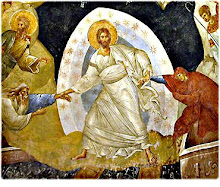Paul states in Galatians 3: 26-29 "For ye are all sons of God, through faith, in Christ Jesus. For as many of you as were baptized into Christ did put on Christ. There can be neither Jew nor Greek, there can be neither bond nor free, there can be no male and female; for ye all are one [man] in Christ Jesus. And if ye are Christ's, then are ye Abraham's seed, heirs according to promise." Similarly Paul reiterates in 1 Corinthians 12: 13 "For in one Spirit were we all baptized into one body, whether Jews or Greeks, whether bond or free; and were all made to drink of one Spirit." Paul lays out in these passages the very fact that our unity is tied up in our baptism. This confession of unity is tied to our beginnings in the Church and should remind us where we came from. No badge of ethnic Judaism (such as circumcision) mattered anymore. We forget how explosive this passage would have been to a church that was rocked by ethnic, racial, and gender differences. People that were once considered unclean or unfit for fellowship were now considered fellow children of God and heirs to the promise made to Abraham. I think the irony is found in the fact that Paul uses a baptismal formula to make this point about unity.
Next, Paul states in I Corinthians 10 :16-17 "The cup of blessing which we bless, is it not a communion of the blood of Christ? The bread which we break, is it not a communion of the body of Christ? seeing that we, who are many, are one bread, one body: for we are all partake of the one bread."
It should be no surprise that Paul once again uses a rite of the Church to make a point about Christian unity. In the very act of the Eucharist Paul makes the point that we should be reminded of our oneness in Christ. On each first day of the week Christians gather all over the world and commune with Christ at His table and in this fact we are mystically united one with another. In the non-canonical Didache (a document from the late 1st century that gives practical instructions on things such as baptism and the Eucharist) the writer of this document states the following concerning the Lord's Supper: And concerning the broken bread:
The writer of this ancient document saw how the broken bread of the Eucharist is a symbol of our Christian unity in much the same way that the apostle Paul stated in I Corinthians.We thank Thee, our Father, for the life and knowledge which You madest known to us through Jesus Thy Servant; to Thee be the glory for ever. Even as this broken bread was scattered over the hills, and was gathered together and became one, so let Thy Church be gathered together from the ends of the earth into Thy kingdom; for Thine is the glory and the power through Jesus Christ for ever..
I believe that the first step toward unity among all Christians is for all of us to reflect on what makes us simply Christian. We must also realize that God will not leave us where He found us but will continue to work in our lives and make us more and more into His image as we grow. What can we learn from these passages concerning baptism and the Eucharist? Can we find room for each other at the Lord's Table? Can we remember the pledge we all made to Christ in our baptism and remember our common origin and now, thank God, our common destination? Would the principalities and powers of this present age take Christians more serious if they saw the Body of Christ unified and ready to allow God to work through us as His conduit in the world? Maybe we should all consider the phrase 'lex orandi, lex credenti' as we strive to become part of God's narrative of salvation for this world.






